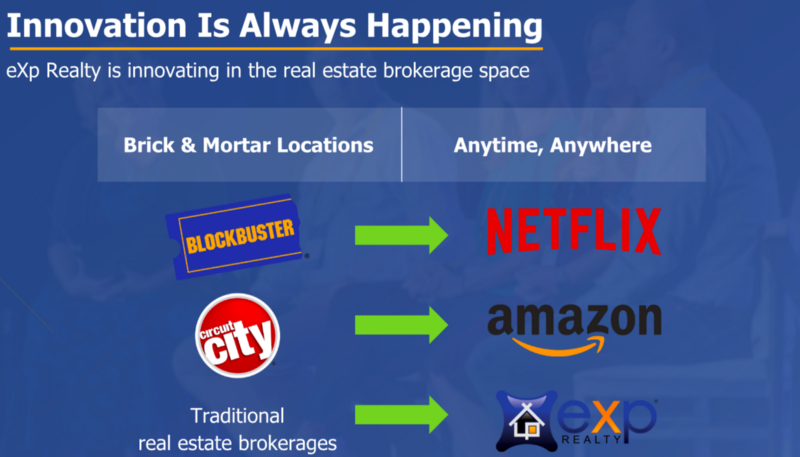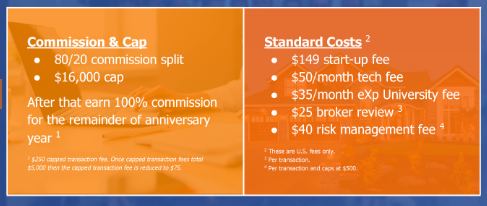You are viewing our site as a Broker, Switch Your View:
Agent | Broker Reset Filters to Default Back to ListVirtual Is Becoming a Reality in Real Estate
February 18 2019
 There are new and exciting entrants into the real estate industry every year. While much of the focus the last calendar year has been on Compass, one firm that was born during the recovery from the great recession, eXp Realty, has been growing at a clip that should be hard to miss.
There are new and exciting entrants into the real estate industry every year. While much of the focus the last calendar year has been on Compass, one firm that was born during the recovery from the great recession, eXp Realty, has been growing at a clip that should be hard to miss.
Since 2017, eXp Realty's stock price has swelled more than 300 percent following its listing on the NASDAQ, and it continued its success by increasing their number of agents 145 percent in one year to over 16,000 agents across more than 300 markets in the US and Canada.
Who is eXp and why are they different? The firm has taken out the literal 'real' in the industry name and replaced it a fully-developed virtual environment for its agents to communicate, educate, process transactions, and essentially operate.

eXp Introductory Presentation
While the buying and selling of homes is real, eXp is attempting to look deep into the future of the industry and understand how technology, remote-working, and virtual reality can play a part in managing a national real estate brand.
A Day in the Life
"The virtual campus is a big part of our growth engine. If we were to have the constraints of physical offices, the growth we've had simply wouldn't be possible." — Scott Petronis, CTO of eXp, to Singularity Hub
"eXp World" — the virutal world built by VirBELA — is a Sims-like virtual space filled with avatars of company agents conversing, attending training events, shuffling to leadership talks, and even simply meandering around and checking out the soccer stadium or taking a casual boat ride (yes, it has those).
In order to chat with another agent in eXp World, simply use your keyboard arrows to walk over to them and start chatting over your headset. If you need to make it a private conversation so that others in your area (within the virtual space) cannot hear, you can step inside the dotted perimeter of tables and other areas that will mute your conversations by those standing outside the circle. Also within the world are lists of those agents who are currently logged in and a map to zoom in and out of the virtual campus.
Why It Could Dominate
Gimmicks aside, from a company standpoint, eXp could represent a serious challenge to industry incumbents and traditional business models. Here are five reasons eXp could become the model of the future:
1. Not just a virtual space: eXp smartly integrates best-in-class tools like Google's G-Suite, Trello for project management, and Slack for communication. Compared to independent and boutique brokerages that often suffer from providing free MLS tools to their agents (and, worse, clients), eXp could have an advantage by adopting better techonlogy, virtual space aside.
2. Sharing is caring: Keller Williams is a national franchise, but how easy is it for KW agents to share knowledge throughout the firm? eXp can leverage its virtual space to enable better collaboration, knowledge sharing, networks and resources, all at a much lower cost to the company at scale.
3. Formalized Training: Need to quickly and easily disseminate training videos and host brainstorming sessions? A virtual environment is much more friendly to company-wide trainings and events that require participation than being on the phone or sitting idly in front of a screen can deliver. Interactive opportunities in the virtual space are more likely to result in engaged learning (think video games vs. watching a video).
4. Higher Commissions Attracting Better (and Younger) Talent: Nearly half of Realtors in the United States are 60 years of age of greater. With an influx of both younger and tech savvy agents and consumers, a firm that offers cutting edge technology can attract top talent. Not only that, agents pay no desk fees and can earn "cascading revenues" from agents they bring on (and who subsequently bring on additional agents). This, combined with the ability to work remotely, plays into the hands of a younger generation of agents to come.

eXp Realty
5. Faster Growth: It's possible eXp may simply run away from the competition. In order to add headcount, agents just need access to the Internet. There's no brick-and-mortar constraints, office leases, and other traditional expenses to consider. The cloud-based business can operate at considerably higher margins due to its focus on technology. This is something even Compass cannot claim.
So what can go wrong?
Why It Could Fail
While I would consider eXp generally forward thinking, there's a lot to be said about why this may ultimately not become the model of the future:
1. What happened to local expertise: There's a lot to be said for local expertise. In fact, it's likely the bulk of an agent's purpose. How much added benefit can exposure across markets, gaining mentors in different time zones, and sharing resources from coast to coast ultimately provide? If eXp's goal is to allow brokers to operate across state lines, I doubt there's much success to be had from simply dropping your brand and agents in an unfamiliar backyard.
2. Not a model for all sizes: Franchises and national brokerages have the most to gain from a collaborative, digital space. Continuing the theme above, local, independent boutiques that offer high-touch service, hyperlocal knowledge, and years of experience are more valuable than investing in virtual spaces when all your agents are local. There's very little value-add to the majority of firms.
3. What about the consumer: How does this benefit the consumer? We've discussed this at length with our startup, as the majority of tools in the space are broker-first, often to the disadvantage of the client experience. Are companies that are investing in virtual meeting rooms prioritizing clients? More on this below.
4. Technology itself is not a solution: Again continuing a theme above, simply throwing technology at a problem does not create a solution in and of itself. It still requires talented management, skilled agents, and well-executed marketing.
Keller to Follow Along
Often, market demand is validated by existing competitors and followers. To that extent, Keller Williams is throwing its hat in the ring with plans to open nearly 200 expansion businesses.
"What we're seeing with our technology, what we're seeing with our innovation, we're preparing for the next 15–20 years down the road, and we're really excited that technology is allowing us to do this." — Keller CEO John Davis to Inman
One advantage KW sees in expanding through 'market centers' is streamlining and leveling the playing field across all its markets — there's one set of rules and policies that apply — that will allow the franchises to optimize their expenses.
Details are still sparse on just how much integration the virtual setting will have against an obviously strong brick-and-mortar presence in the US, but the company certainly sees value in the offering to stay competitive. Keller is obviously unlikely to move to a fully virtual model, so what does this say about the value-add of what the virtual model brings to existing, traditional business models?
What Does It Teach Us About the Future?
What the virtual model may appear to get right is the focus on consumer-first. Developing and prioritizing digital tools that fit into what consumers demand (i.e., mobile solutions and intuitively designed technology platforms). The end-goal for virtual brokerages is to take that technology so far that it replaces the need for a physical office. This doesn't need to be the end goal for everyone else.
"This is not just what people are wishing their business interactions were like. This is what they are experiencing in everything from their banking and investing down to hailing an Uber. This is the expectation they have been bringing to the home buying and selling process. By comparison, they have found the traditional real estate experience to be disappointing." – Tamir Poleg, CEO of Real, to Dotloop
As Dotloop states, there are four major advantages to being app-driven:
- Full Adoption: A major benefit is full adoption received from the agents, especially in an industry where the vast majority of agents are independent contractors and not required to use their broker's technology.
- Full Implementation: With everyone on the app, brokerage-wide changes can be implemented more easily.
- Full Measurement: Managing brokers can more easily track progress, set goals, and measure key performance indicators.
- Full Offering: Much of the savings can be passed through to agents in the form of higher splits, providing a full package of technology and compensation.
Importantly, while technology-enabled agents are critical, these technologies also offer benefits to the consumers in the form of a mobile solution, agents who are more responsive, and a home buying or selling process that comes with less friction than one that features swapping emails with Zillow links, messaging over text and voicemails, and clunky MLS-tool searching.
Unfortunately, it's rarely easily accomplished.
The Build-Buy Decision
Brokers today are faced with a difficult build vs. buy decision. Many do not have the funds or the talent to develop these tools in-house, and existing options throughout the market either do not fully meet needs or, critically, are not designed from the consumer experience. Looking at what Compass, RE/MAX, Keller, and other national brokerages are developing, pressure is on in the industry for independent firms to stay relevant and invest in technology.
Fortunately, it's unlikely that success means ditching the reality and heading into virtual insanity.
To view the original article, visit the Homebloq blog.









